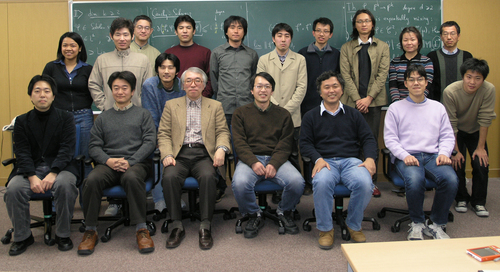Handling editor: Meirong Zhang
The Kyoto Dynamical Systems Research Group in
Mathematics
The Kyoto dynamical systems research group in Mathematics consists
of seven faculty members and about ten graduate students and postdocs
of Kyoto
University, as well as two faculty members of Ryukoku University, a private university in Kyoto.
This is the largest research group of dynamical systems in Japan not
only in terms of membership but also in research activity. Regular
meetings of our group (Dynamical
Systems Seminar) are held every Friday afternoon in the Department of Mathematics at Kyoto University.
A wide variety of talks are given by the core members as well as
researchers of other Japanese universities and visitors from
abroad.

Photograph taken after the Dynamical Systems Seminar, December 24,
2004
front from left: Masashi Kisaka, Masayuki Asaoka, Shigehiro Ushiki,
Hiroshi Kokubu, Mitsuhiro Shishikura, Hiroyuki Inou
back from left: Vivien Visaya, Hiroki Takahashi, Teisuke Jin, Toshi
Sugiyama, Kazutoshi Maegawa,
Zin Arai, Yosuke Okumura, Tien-Cuong Dinh (Orsay, speaker of the day),
Mitsuru Shibayama, Eiko Kin, Tetsuo Ueda, Kohei Ueno
The research interests of our group members cover a wide spectrum
of topics. The names of the faculty members of Kyoto and Ryukoku
University together with their brief research descriptions are as
follows:
- Shigehiro Ushiki: complex dynamical systems, complex
transfer operator, hyperfunction, sheaf cohomology,
- Mitsuhiro Shishikura: complex dynamics in dimension one
and higher,
- Hiroshi Kokubu: bifurcation theory, Conley index,
application of dynamical systems,
- Masashi Kisaka: complex dynamics, transcendental
entire functions,
- Masayuki Asaoka: low dimensional dynamics and foliation,
- Hiroyuki Inou: polynomial dynamics, renormalization,
- Zin Arai: Conley index, homoclinic bifurcation,
computer assisted proof,
- Toshikazu Ito: global properties of holomorphic vector fields or
1-forms,
- Hiroe Oka: bifurcation theory, Conley index, chaos,
singular perturbation.
Graduate students and postdocs study complex dynamics, hyperbolic
dynamics, topology in dynamical systems, ergodic theory, Hamiltonian
systems, time series, and so on. Within the University, we frequently
have communication with other research groups in nonlinear dynamics
(e.g., Physics and Engineering) through seminars and individual
discussions.
Our group leads the dynamical systems research in Japan. In August
2002, an international conference on "New Directions
in Dynamical Systems" was held in Kyoto as a satellite conference
of ICM 2002 (Beijing, P. R. China). There were 217 participants from
30 countries, 131 of whom gave talks and poster presentations. Much
of the organization work was successfully carried out by our research
group from both Kyoto and Ryukoku University (Chief organizer:
Shigehiro Ushiki).
In 2003, the special project of the Research
Institute of Mathematical Sciences (RIMS) of Kyoto University was
devoted to Complex Dynamics and was organized by Mitsuhiro
Shishikura, a core faculty member of our group.
Aside from these two big activities, there is a workshop series
called "Kyoto Dynamics Days" which is organized ocassionally with various special topics and a selection of main speakers. The
first workshop was held in May 2001 with the main
speakers Adrien Douady and John Hubbard, the second was in February
2003, and the third and the fourth were in 2004. The
fifth one will be in January 2005 with the main
speaker Pieter Collins. Several workshops have been and will be
organized at Ryukoku University as well. The most recent ones are:
RIMS
was founded as a cooperative research institute at the
inter-university level, and hence yearly organizes more than 60
workshops on various subjects in Mathematics. One of the advantages
of being in Kyoto is being able to attend many workshops
easily. Almost every year, there are several workshops devoted to or
related to dynamical systems. Each one originates from a different
point of view -- from geometric aspects to analytical and to
computational, and from purely mathematical to applied (this includes
physics, biology, and enginering). Naturally, some of these workshops
were organized by members of our research group. Below are some
titles of the recent workshops related to our research group:
- Dynamical systems and ergodic theory (2004),
- Developments and applications of dynamical systems theory (2003),
- Complex dynamics and related topics (2002),
- Complex systems and theory of dynamical systems (2001).
The city of Kyoto has a unique historic character
with the addition of Kyoto University as one of the leading research
universities in Japan. Because of this combination, Kyoto University
attracts many mathematicians from all over the world. Every year, we
continue to have foreign visitors working on dynamical systems making
it easy for us to establish international ties with many reasearchers
around the world. Some of our members continue to have long-term
collaboration with foreign research groups in the USA, France,
Germany, Brazil, China, and other countries.